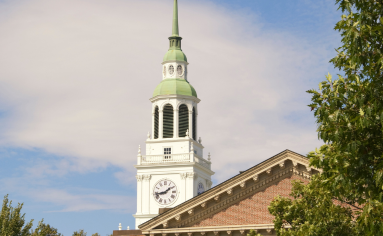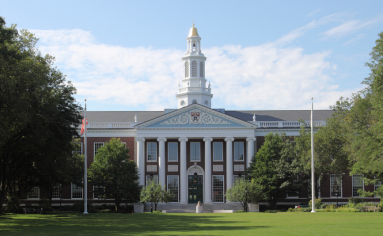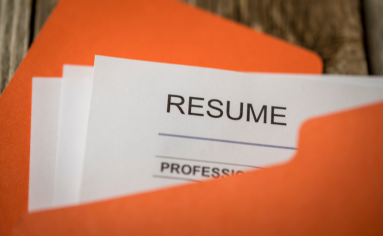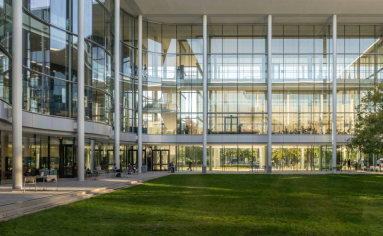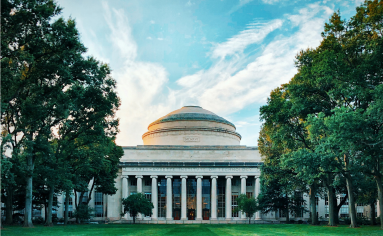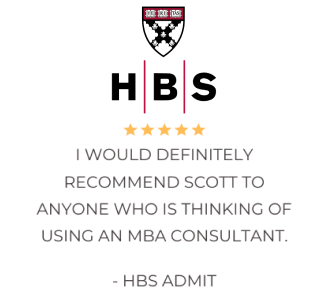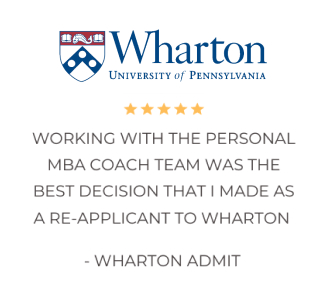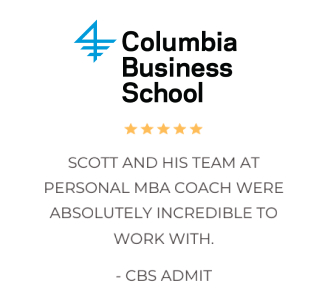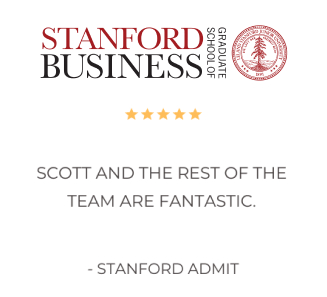One of the top reasons for an MBA is to explore career paths in an open environment. Through Columbia Business School’s Executives in Residence program, Columbia MBA students have the opportunity to do just this, building lasting relationships with business leaders.
The program is made up of 25 senior executives from the C-Suite of Fortune 100 companies, as well as senior partners, chairmen, and CEOs. The Executives in Residence program is the oldest and largest of its kind, providing access to powerful mentors and advisors.
Below, read Personal MBA Coach’s exclusive interview with Al Drewes, Columbia Executives in Residence Program Director (or watch here)!
Scott Edinburgh: Hello everyone, my name is Scott Edinburgh. I went to MIT for undergrad, Wharton, I’ve been a personal MBA coach for the last 15 years. We help folks around the world get into top programs, through tutoring, admissions consultancy, essay editing and interview prep.
Columbia is one of our favorite programs and I am super excited to have Al Drewes here with me today, to talk about the Columbia Executives in Residence program. So Al, I’ll let you introduce yourself and do a brief overview of the program and we’ll do some questions.
Al Drewes: Thank you, it is a pleasure to be here today. So, I graduated from Columbia in 1982, went to work for Pepsico at the time and stayed with Pepsico and a related company for 28 years, becoming the CFO of the Pepsi Bottling Group – which was a fortune 160 company – and then I went on to do private equity for a few years. Now I’m helping run this program which is very exciting, and I am happy to talk to you about it today.
Scott Edinburgh: So let’s talk a little bit about how the program works; How many executives are there, how people get matched up with executives, maybe we can start there.
Al Drewes: Yeah sure, so there are 25 of us, we volunteer our time, and the primary thing we do is we coach and mentor students. We had 1500 meetings with students last year, these are usually about career questions, but sometimes about work life balance and entrepreneurial ideas and so forth.
There are 25 of us, we’re almost all either C-Suite executives from major corporations, or people from similar positions from consulting firms or banks and so forth. We have 2 former senior partners from McKinsey and BCG, we have a fellow who is on the executive committee of Evercore, 5 former CEOs and chairmen of companies like Macy’s, Wyeth Labs, Quest Diagnostics, and we have a couple CFO’s like myself. These are very high caliber people who volunteer their time to coach and mentor students on whatever topics are relevant or of interest, needed by the students.
Scott Edinburgh: That’s great, super exciting, I had some of those but not quite at the same level of expertise. So, do you have any examples – I am sure you have many examples – but, maybe you can give an example of something that someone learned from these meetings.

Al Drewes: Sometimes it’s as simple as having a half an hour conversation with a student and helping them clarify their thinking. I would say more times than not that’s what happens; a good example is a woman came to see me in her first term a few years ago, and she’d been working in private health management for a major bank, and she wanted to become an investment banker. She was concerned that somebody from a private wealth management background didn’t have the credentials to get an investment banking job in one of the top tier firms.
I talked to her for about 10 minutes, and I almost thought it was kind of funny to tell you the truth that she was having this angst about this, because she was the most fantastic candidate for an investment banking job. I just looked her in the eye and said to her “stop worrying about it, you are as good, great a candidate as anybody in this class” and she kind of listened to me for a minute, and all of a sudden a weight was lifted off her shoulders.
If you fast forward, she is graduating right now, she has gotten a great investment banking job with a very, very top tier firm, that anybody would die for. In the course of that conversation, she had a little bit of crisis of confidence and that little nudge was basically enough. I also said to her go meet with Eduardo Mestre and Barbara Byrne who are two executives in our program, who are both very senior investment bankers and talk to them about it and so there are many stories like that. There are also stories where it’s a longer term kind of relationship as well.
Scott Edinburgh: That’s great, that is one of the reasons I got into this, I had a client who was working in media out in L.A. for 8.5 years and really wanted to work in investment banking, and we didn’t want to write in the essays because we thought it was a bit risky. But went into investment banking, and got there, and it took some nudging. As you think about this program vs. others, what are some things that might separate Columbia’s Executives in Residence from other similar programs?
Al Drewes: We actually had two second year students do a deep dive competitive bench marking of the program comparing it to other school. Nobody really has a similar program, nobody really has the seniority of the folks, the breadth, and the access that students have to us. Many of the other schools focus on entrepreneurship, we focus on anything you really want to talk to us about.
Another example I had a student come to me three years ago, who wanted to start a beverage company, and since I worked at Pepsico, he was interested in my advice in a product idea that he had, he graduated, he runs a business and I still talk to him once a month he tells me he’s struggling with this, how do I price that, and tell him to think about it this way.
There is a breath of activities, any student can sign up to see one of us, you can sign up multiple times, there are people who have seen 10 executives, and there are people who have seen me 4 or 5 times over the course of a year and a half, or they may just come one time, it is really up to the students. This is very different from what other schools have and again it could be career counseling, entrepreneurial idea, career advice, work life balance, it could be what courses should I take, I am doing a case study how should I think about the case study. Mostly it’s about careers but it could be any of those things.
Scott Edinburgh: We talked a little bit about this earlier on but how long do the relationships tend to last and any advice that you have for folks who are trying to make the most of this kind of program.
Al Drewes: I’d say to students is, in the first term, come see us right away. Some students don’t do that, the reason I say this is because the critical path item is going to be your summer internship. And you’re also going to be kind of inundated once you get into the classes, and job interviewing, it can be pretty overwhelming for folks in the first term.
So, to get some early on advice in a summer internship in my view is a really good thing, because the summer internship can set you up for great things for your full-time employment. So I try to encourage students to come see us as early as possible. I think there is no one way to do this, some students come, I’ll see them one time, and then I won’t see them again.
Other students will come, they’ll go from somebody else, to me, they’ll go through the program, and then maybe they’ll come back. Then, there are more than a few instances where people have multiyear relationships with people. And we’re also available to alums, too. Sometimes we get alumni who are looking to career pivot, they’ve hit a wall, they’re trying to figure out what to do. They’ll come and see us as well.

Scott Edinburgh: That’s great. That alumni availability is really, really important. Is there anything else we would be surprised to know about the program?
Al Drewes: One thing is, we all volunteer, we do this because we enjoy doing it, we enjoy meeting with students – it’s actually really fun. Students should know that if they choose to come to Columbia and they want to come see us, we want to see them. We like it. We are not getting paid, we just do it because we like meeting with students.
In the situation like I described, with this women, who wound up with the investment banking job, it’s kind of nice to say “I helped that woman get what she wanted” and there are a lot of those stories, and that’s just a very nice thing. So we love it. I want students to come to Columbia, come to the new campus and come see us and we will be very happy about that.
Scott Edinburgh: Any other piece of advice or closing words that you have today? We can talk about the situation we have here, the economy, anything like that?
Al Drewes: Students will ask in sessions, in Columbia, “If I had to do my MBA over what would I do differently?” One thing I say is that the MBA experience is an academic experience, and it’s an experiential experience. Maybe not a proper use of the English language, but it’s an “experiential” experience.
Don’t sell the experiential part short during your time there. If you have access to a program like this, or if you’re in New York, and you have access to all the business and the commercial activity that’s going on in New York, make sure to take advantage of that, as that will be really profound in shaping your career and things that you will take with you for the rest of your life.
Scott Edinburgh: That reminds me, one regret I have is on one of those organized trips, I didn’t do them because I thought they were too expensive at the time and I was sitting thinking “I probably should have done them.”
Al Drewes: It’s exactly what I am talking about, or you’re too busy because some speaker is coming to campus and you don’t go, and then you regret it because you didn’t do it.
Scott Edinburgh: Super helpful! Thanks for all the great work that you do, I know many of our clients and many Columbia MBA students love it, so really appreciate that. If you want to learn more about the program jump on our website.
Applying to the Columbia University MBA program? Check out Personal MBA Coach’s CBS site page to find out what sets the full-time MBA program apart, the latest class profile information, essay advice and more.
The Columbia University MBA program is among the programs that Personal MBA Coach Round 1 clients are getting a head start on this spring. Find out more about what to expect from the 2022-2023 MBA essays here.






